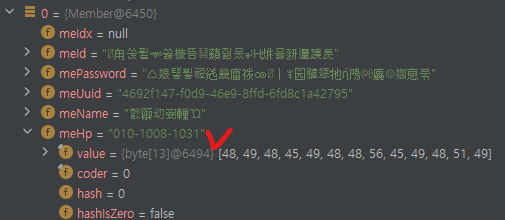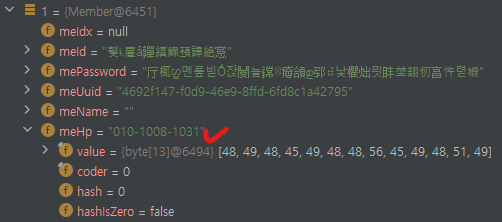Fixture Monkey 라이브러리 - 랜덤으로 값이 할당되지 않는 문제
서론
- 이전 글에서 객체의 필드값에 랜덤으로 값을 할당했었는데 실제로 테스트 해보니 랜덤이 아니었던 문제가 있었다.
- 이는
sampleList()사용할 때 발생하였으며, 원인을 정확히 파악하지는 못했지만 라이브러리를 뜯어보며 나름의 가설을 세워보았다. - 이전 글에 추가하려 했으나 점점 길어져서 따로 작성하게 되었다.
라이브러리 뜯는게 끝이 없는 작업임을 깨닫게 되었다.
관련 코드
수정 전 코드
1
2
3
4
5
public static String generateRandomPhoneNumber() {
return "010-" +
Arbitraries.integers().between(1000, 9999).sample() + "-" +
Arbitraries.integers().between(1000, 9999).sample();
}
수정 후 코드
1
2
3
4
5
6
public static Arbitrary<String> generateRandomPhoneNumber() {
return Arbitraries.integers().between(1000, 9999)
.flatMap(firstPart ->
Arbitraries.integers().between(1000, 9999)
.map(secondPart -> "010-" + firstPart + "-" + secondPart));
}
문제가 발생했던 코드
- 관련 없는 필드들은 없애고 핵심 코드만 보겠다.
1
2
3
4
5
6
7
8
9
10
11
12
13
14
15
16
public class FixtureMember {
private static ArbitraryBuilder<Member> member() {
return fixtureMonkey.giveMeBuilder(Member.class);
}
public static ArbitraryBuilder<Member> memberArbitrary() {
return member()
.set("meHp", generateRandomPhoneNumber()) // 회원 전화번호
}
public static List<Member> getMemberList(int count) {
return memberArbitrary(null, null)
.sampleList(count);
}
}
반환 타입 변경
- 수정 전 코드가 더 깔끔하고 알아보기도 쉽지만, 굳이굳이
flatMap,map메서드를 써가며 복잡하게Arbitrary객체를 반환해야만 랜덤값이 적용되었다. - 실제 테스트해본 결과
sampleList()메서드로 여러 개의 객체 값을 생성할 때 수정 전 코드에서는 참조 객체가 모두 같았다.
[수정 전 코드로 테스트한 결과]
- 0번째 객체
meHp의 주소값과 1번째 객체meHp의 주소값이 같다.
- 0번째 객체
- 1번째 객체
[수정 후 코드로 테스트한 결과]
- 0번째 객체
meHp의 주소값과 1번째 객체meHp의 주소값이 달라졌다.
- 0번째 객체
- 1번째 객체
[Arbitrary 코드 뜯어보기]
sample()메서드
1
2
3
4
5
6
7
8
@API(status = MAINTAINED, since = "1.3.0")
default T sample() {
return this.sampleStream()
.map(Optional::ofNullable)
.findFirst()
.orElseThrow(() -> new JqwikException("Cannot generate a value"))
.orElse(null);
}
sampleStream()메서드
1
2
3
4
@API(status = MAINTAINED, since = "1.3.0")
default Stream<T> sampleStream() {
return ArbitraryFacade.implementation.sampleStream(this);
}
- 여기서 눈에 띄는건 값을 1000개까지 생성하면서, 클래스에
Random객체를 주입받는다고 한다. - 주입받는 시점에서 동일한 시드값을 통해 주입받으면 똑같은 값이 나올 수 있다.
- 하지만 발생한 문제는 똑같은 값이 아니라 똑같은 객체를 참조하고 있는게 문제였다.
[Fixture Moneky 내부 코드 뜯어보기]
- 나는
jqwik라이브러리에만 집중을 한 나머지sampleList()를 놓치고 말았다. sampleList()는 Fixture Monkey 라이브러리에서 구현한 메서드로서 아래와 같이 구현되어 있었다.ArbitraryBuilder의 구현체인DefaultArbitraryBuilder의 일부이다.
1
2
3
4
5
6
7
8
9
10
11
12
13
14
15
16
17
public Arbitrary<T> build() {
ArbitraryBuilderContext buildContext = context.copy();
return Arbitraries.ofSuppliers(() -> (T)resolveArbitrary(buildContext).combined());
}
public T sample() {
return (T)resolveArbitrary(context).combined();
}
public Stream<T> sampleStream() {
return this.build().sampleStream(); // 마지막의 sampleStream은 jqwik의 sampleStream이다.
}
public List<T> sampleList(int size) {
return this.sampleStream().limit(size).collect(toList());
}
- 사실
combined라던지,ofSuppliers라던지 핵심 구현 로직은 나오지 않았으나 너무 글이 길어지기 때문에 넘어가겠다.
그래서 원인은?
- 보통 우리는 여러 개의 객체들을 생성할 때 for문과 같은 반복문을 이용해서 직접 생성한다.
- 그래서
sampleList()또한 반복문으로 생성되며,generateRandomPhoneNumber()같은 로직도 반복문을 통해 서로 다른 값들이 반복해서 생성될 것이라 생각했다. - 하지만 반복이 아니라
combined()로 ‘무언가를 엮는구나’ 라고 깨닫게 되었다.
[가설 1]
- 한번
sample()로 만들어진 객체는 임시Arbitrary저장소(ArbitraryBuilderContext라고 추측한다.)에 보관된다. sampleList()는sample()로 매번 랜덤으로 값을 생성하는 대신에 저장되어 있는 객체 들을 꺼내씀으로써 성능을 최적화시킨다.캐시와 비슷한 메커니즘이다.
[가설 2]
sampleList()는 반복문으로 객체 리스트를 생성한 게 아니었다.- 때문에 한번 실행되는
generateRandomPhoneNumber()도 고정된 문자열로 반환이 되었던 것이다. - 무조건 Arbitrary 객체로 반환해야 값이 고정되지 않고 서로 다른 값을 가진 객체 리스트가 만들어지는 것이다.
- 실제로
MonkeyManipulatorFactory의 메서드 일부에는 다음과 같이 구현되어 있다.
1
2
3
4
5
6
7
8
9
10
11
12
13
14
15
16
17
18
19
20
private NodeManipulator convertToNodeManipulator(int sequence, @Nullable Object value) {
.
.
else if (value == Values.NOT_NULL) { // null 이 아닌 일반 객체인 경우
return new NodeNullityManipulator(false);
}
.
.
else if (value instanceof Arbitrary) { // Arbitrary 객체인 경우
// ArbitraryBuilderContext 에 등록..?
return new NodeSetLazyManipulator<>(
sequence,
traverser,
decomposedContainerValueFactory,
LazyArbitrary.lazy(() -> ((Arbitrary<?>)value).sample()) // 이제서야 랜덤한 값을 생성?
);
}
.
.
}
마무리
- 라이브러리를 뜯으면 뜯을수록 이해는 할 수 없었지만 깔끔하게 잘 구현해놨다는 느낌은 받았다.
- 시간복잡도
n에서 어떻게든log n으로 성능을 최적화해내는 실력이 경이롭다.역시 네이버인가?
This post is licensed under CC BY 4.0 by the author.




